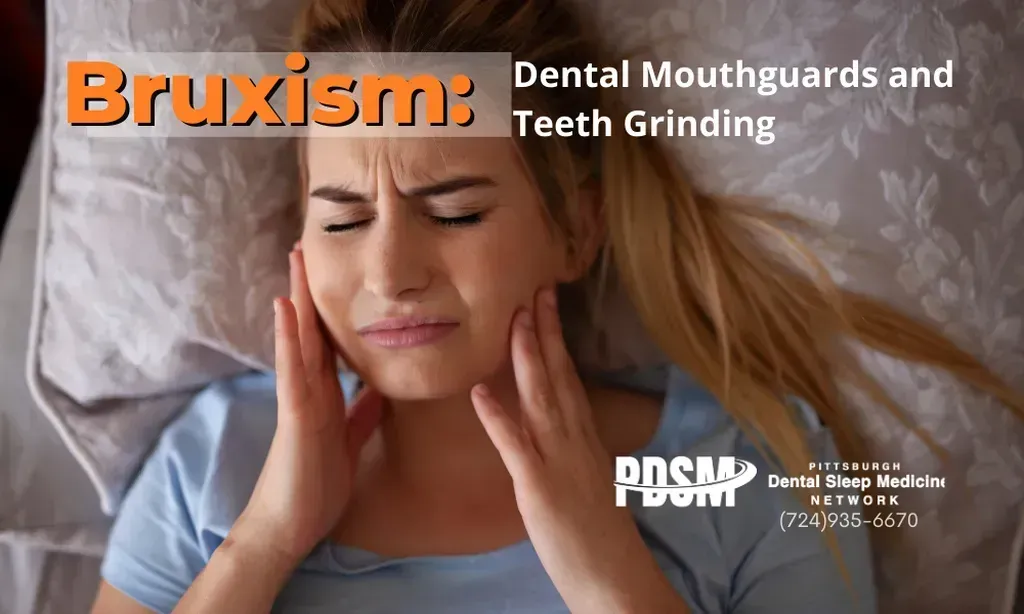Bruxism: Grinding and Clenching ~ Symptoms and Solutions

Dental Mouthguards and Teeth Grinding (Bruxism)
Bruxism is the habit of consciously or unconsciously gritting or grinding the teeth especially in situations of stress or during sleep. It is most commonly described as teeth grinding or clenching the teeth. It can occur during sleep and /or wake times.
The precipitating factor for Bruxism may be related to stress, use of stimulants like caffeine and nicotine, use of certain medications – particularly anti-depressants–, or a protective mechanism during sleep to allow better breathing by moving the lower jaw (and therefore the tongue that is connected to it) forward by bracing the lower and upper front teeth against each other.
When an individual is determined to have evidence of Bruxism, it often appears or manifests as enamel wear most commonly in the six anterior (front) teeth. They are often provided a mouth guard by their dentist for nighttime wear to cover the teeth on the upper or lower arch. The understanding is that the mouthguard will stop them from grinding or clenching the teeth.
The Mouthguard MYTH
It is a MYTH that the mouthguard will STOP the grinding habit. At most, the mouthguard will protect the teeth from further wear if the habit is current and the patient continues to clench/grind.
If a patient is symptomatic from bruxism and experiences soreness to the jaw muscles in the cheek, temples, or neck or discomfort in the jaw joints (TMJs), then the mouthguard is most commonly prescribed and can be therapeutic IF it is designed properly. Other treatment methods may be suggested such as injecting Botox into a sore jaw muscle, however, it DOES NOT stop the muscle from contracting or stop the clenching habit. The Botox will merely weaken the muscle as it contracts to lessen the symptoms. Care must be taken when using Botox as repeated use overtime to the same muscle group will not only weaken the muscle but can cause it to “droop”. Other more natural-based substances can be used to calm down “hot” muscles as a replacement for Botox that have no negative side effects.
Left untreated, Bruxism may manifest as symptoms of a disorder of the jaw joints (TMJs) such as clicking or grinding sounds on opening or closing the jaw, pain with the jaw at rest or while chewing or talking, or locking of the jaw with the inability to fully open the jaw. The associated pain is usually sharp and stabbing and located right in front of the ear.
Bruxism can also manifest as a disorder of the jaw muscles presenting as a dull ache, or tightness in the cheeks, temples, neck, or back of the head that can be associated with head pain or a headache.
Determining Scope of Treatment for Disorders Involving the Jaw Muscles & Jaw (TMJ) Joints
Dental orthotic appliances, often described as mouthguards, that are designed to treat different disorders related to the jaw joint (TMJ) and jaw muscles are custom-fabricated. The orthotic is properly prescribed for wear during sleep, daytime, some combination of both, or 24/7, depending on the diagnosis.
Dental orthotics may be used ‘stand-alone’ to treat the disorder or with other needed therapies which, at Pittsburgh Dental Sleep Medicine, may include muscle or TMJoint injections, specific exercises, ultrasound , topical medicaments, electromyography (measure muscle contraction intensity) and nutritional support.
Proper diagnosis is determined by means of a thorough patient history, clinical examination, and radiographic or magnetic resonance (MRI) imaging. This is key to developing a treatment plan that can effectively reduce symptoms and improve function. Conservative treatment planning is usually the best and recommended approach. In the majority of cases, this approach resolves symptoms significantly and can improve anatomic conditions that restore function without pain.
Methodical intervention of the other therapies can be introduced, as needed, for more complete resolution of symptoms or maintenance to prevent symptom recurrence. In more complex cases- with or without conservative treatment initially- surgical intervention may be the best treatment option and confident referral is made to those specialists.
Proper and thorough evaluation and treatment of jaw joint and jaw muscle problems is within the scope of a dentist who is highly educated, trained, and experienced in TMJ disorders. Solving the puzzle of a TMJ disorder of the jaw joint or jaw muscles is much, much more than just making a mouthguard to fit over the teeth!
- Dr. Michael F. Hnat, DMD, DABDSM, DABCDSM, FAACP
To schedule an appointment with Dr. Hnat, or one of our other sleep medicine dentists in Wexford, Monroeville, or Latrobe, PA, call
Pittsburgh Dental Sleep Medicine at (724)935-6670 or
contact us through our website.

